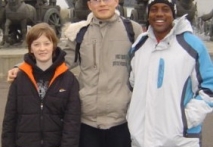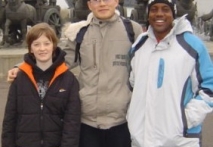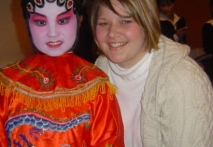学习心得
语风汉语学生Jennifer
学习心得
语风汉语学生Jennifer
我叫Jennifer,我非常喜欢在语风汉语无锡校学习汉语,这是一个非常好的学...
语风汉语无锡校 Zack
学习心得
语风汉语无锡校 Zack
我叫Zack,我是法国人,无锡语风汉教中心是一个学习中国文化和对外汉语的好...
语风汉语学生Kevin
学习心得
语风汉语学生Kevin
语风汉语是一个最理想的学习汉语和中国文化的好地方,学校给我们提供了很多...
语风汉语学生Florent
学习心得
语风汉语学生Florent
我非常喜欢无锡语风汉语学校,这里真的有最简单的汉语学习方法,我学习汉...
语风汉语学生Brad
学习心得
语风汉语学生Brad
我叫Brad,我是澳大利亚人,我再语风汉语学校学习汉语。我现在可以独立和我的...
语风汉语我的无锡学习汉语之路
学习心得
语风汉语我的无锡学习汉语之路
Cherry Queen 中文名: 钱沫以 &nbs...
无锡语风汉语优秀汉语学生Victoria
学习心得
无锡语风汉语优秀汉语学生Victoria
维多利亚Victoria,来自德国的一位11岁的小女孩 ,现读于语...
无锡语风汉语外国学生Michael的汉语学习之路
学习心得
无锡语风汉语外国学生Michael的汉语学习之路
Michael 刚刚来我们无锡语风汉语学校不久的美国学...
苏州汉语学生Jude
学习心得
苏州汉语学生Jude
我叫Jude,在苏州语风汉语学校学习汉语,我也在无锡语风汉语学校学习过很长时间...
无锡语风汉语学校Jessie
学习心得
无锡语风汉语学校Jessie
我学习汉语已经八年了,我能听明白别人说汉语,但是我自己说汉语却觉得说...
汉语 加官方
关注了解更多对外汉语资讯

0510-81151808
1866 1199 988
Sandy.Swun
519988808
无锡新区长江一号 茂业
深茂商务中心8号楼405室
无锡语风学校
语风汉语教学中心
无锡语风国际教育交流中心
Wuxi Mandarin Education School
-
Home > 资讯中心 > 语风无锡英语培训知识分享
On the Character 神 (Shén)
The notion of a Thunder God is a familiar figure in popular culture—People magazine's sexiest man alive in 2014, actor Chris Hemsworth,springs to mind, wielding the sacred hammer mjolnir to defend New York and London against alien invasions as he declares his undying love for the beautiful Natalie Portman in recent Marvel blockbusters. This Norse-inspired hero represents a well-known cultural trope, but it is perhaps less well-known that the ancient Chinese had a similar way of looking at their deities, so much so that the earliest Chinese character for "god" comes in the form of lightning. It occurred during the Shang Dynasty (1600 BCE – 1046 BCE) when the concept of god was written down as a swirl of lightning on oracle bones. The modern equivalent of the pictogram is 申 (shēn). Later, the radical 示(shì), indicating worship, was added to the left side. 示 was also a pictogram in the form of an altar on which the sacrifice was presented. With that, the character is complete: 神 (shén), the mysterious, all-powerful deity.
According to Chinese folk religion everything is governed by a god: the god of wind, or 风神 (fēngshén); the god of thunder, or 雷神 (léishén); and the god of sun, or 太阳神 (tàiyáng shén). Those are just some of the gods of the sky. When you look down to the earth, there are the mountain gods, or 山神 (shānshén); the sea gods, or 海神 (hǎishén); and the river gods, 河神 (héshén). Even in the modest household of the common man, there's the door god, or 门神 (ménshén), and stove god, or 灶神 (zàoshén), whose duties are to ward off evil and to record the deeds of the family. Of course, practical as the Chinese people are, their most worshiped deity is probably the god of wealth, or 财神 (cáishén). He is often represented as a gentleman with a red silk robe with golden embroidery who smiles and holds a jade scepter named ruyi in his right hand, with a gold sycee (a traditional ingot) on the left, the god of wealth can be found anywhere there's business to be done.
神 can also be used to describe genius and great talent. In the past, people used to refer to a doctor with great medical skills as 神医 (shényī), a particularly smart kid is called 神童 (shéntóng), and a crack shot is 神枪手 (shénqiāngshǒu). 神 goes on to mean "magical and amazing" and forms a series of words and phrases. For instance, 神通广大 (shén tōng guǎng dà) means "be infinitely resourceful", as in 他打探起小道消息来,真是神通广大 (tā dǎtàn qǐ xiǎodào xiāoxi lái, zhēnshi shén tōng guǎng dà), meaning, "He is infinitely resourceful at digging up gossip." 神乎其神 (shén hū qí shén) means "miraculous" but not without a satirical tone, as in 这种保健品被吹得神乎其神 (zhèzhǒng bǎojiànpǐn bèi chuīde shén hū qí shén, this dietary supplement ispraised to the heavens).
神 and 鬼 (guǐ, ghost) often go hand in hand to mean superpowers or the supernatural. 鬼使神差 (guǐ shǐ shén chāi), literally "manipulated by ghosts and gods", is used to describe surprising coincidences, unexpected events, or having done something inexplicable, as in 我鬼使神差地把盐加进了咖啡里 (wǒ guǐ shǐ shén chāi de bǎ yán jiā jìn le kāfēi lǐ). As if manipulated by the spirits, I added salt to my coffee). Another phrase, 鬼斧神 (guǐ fǔ shén gōng) literally means "ghosts' axes with god's technique" and is used to describe uncanny workmanship. The phrase 神出鬼没 (shén chū guǐ mò), literally "to appear like a god and disappear like a ghost", is often used to describe mysterious goings on. If something is conducted in secrecy, we use the phrase 神不知,鬼不觉 (shén bù zhī, guǐ bù jué), literally "unknown to god or ghost".
Chinese culture has never really been heavily religious, especially with the influence of Confucianism. Confucius told people "to respect ghosts and gods but also keep your distance" (敬鬼神而远之 jìng guǐ shén ér yuǎn zhī). In addition, there are a series of god/ghost combinations with negative connotations, such as 牛鬼蛇神 (niú guǐ shé shén), literally "ox ghosts and snake gods", which means "wicked people of all descriptions". Other phrases include 装神弄鬼 (zhuāng shén nòng guǐ, to disguise oneself as a ghost or a deity [to deceive people]) and 疑神疑鬼 (yí shén yí guǐ, be unreasonably suspicious).










